Term 3 Unit 1 | Civics | 6th Social Science - Democracy | 6th Social Science : Civics : Term 3 Unit 1 : Democracy
Chapter: 6th Social Science : Civics : Term 3 Unit 1 : Democracy
Democracy
CIVICS
Unit 1
DEMOCRACY
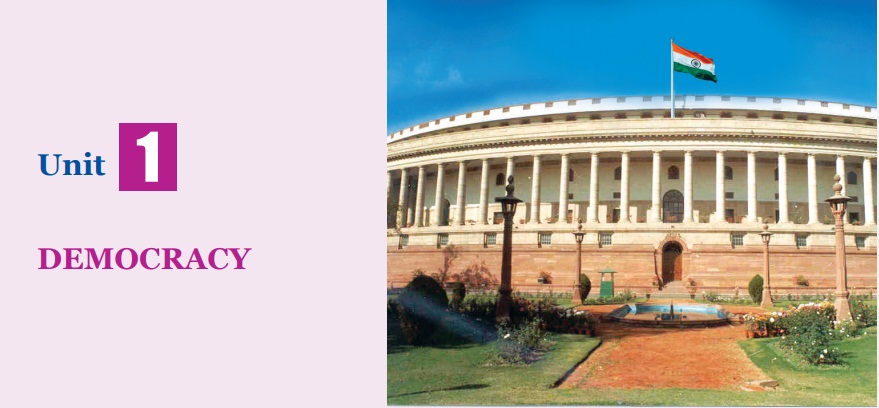
Learning
Objectives
• To know the meaning of democracy
• To know the types of democracy
• To know and appreciate the
structure of our constitution
• To know the aims of democracy
குடிதழீஇக் கோலோச்சும் மாநில மன்னன்
அடிதழீஇ நிற்கும் உலகு’
The world will constantly embrace
the feet of the great king who rules over his subjects with love.
The teachers of Nallur Government High School were
doing the final preparations for the programme ‘Let’s know the society’. The
Singaravelar Hall was filled with students. The Headmaster Mr. Jeeva welcomed
the Chief Guest of the day, Advocate Mr. Rajasekaran. When he brought the chief
guest to the hall, the students observed silence.
Mr. Britto, the history teacher welcomed the
gathering. The chief guest, Mr. Rajasekaran stood up to address the students.
Beloved brothers and sisters! I thank you for
inviting me to this programme. I’m not going to speak on this occasion.” When
he said this and paused, everyone looked at him in wonder.
“Democracy should be found everywhere, shouldn’t
it? So I am going to converse with all of you,” he said. He requested to give a
microphone to the students. Mr. Rajasekar said,
“First let me ask you a question. Do you know what
kind of society did the early manlive in?”
“In the beginning, they were hunters and gathered
food. Later, they settled near rivers and practised agriculture,” said Deepika,
a sixth standard student.
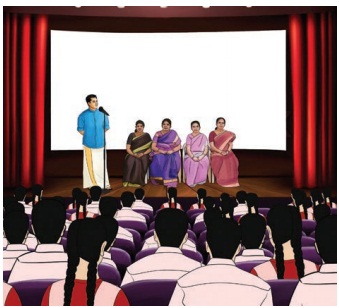
“Yes, when man started to live in groups, tribes
were formed. Every tribe had its own chief. These groups fought among
themselves for land, water and other resources. Those who emerged victorious,
formed kingdoms by uniting the other tribal groups. These kingdoms later integrated
to form empires.”
Arun questioned, “So the chief would have become
the king, wouldn’t he?”
“Yes, that was how monarchies ruled by kings were
formed.”
Suganya asked, “Was this how monarchy emerged in
our country too?"
“Yes, this was how the system of monarchy formed
throughout the world. Also, our country was ruled by kings and emperors and
then came under the British rule.”
The students answered together, “After centuries
of struggle and many sacrifices, we got freedom from British colonialism.”
“We adopted democracy as our ruling system when
our country got freedom,” said Rajasekaran.
Devarajan asked him, “What is democracy?”
“When you start a Sports Club, you’ll share the
responsibilities. Then you would enjoy its benefits, but share the income and
expenditure, wouldn’t you?”
“Yes sir”
Democracy is‘Government of the people, by the people, for the
people’ - Abraham Lincoln
“Similarly, the
citizens of a country select their representatives through elections. Thus,
they take part in the direct governance of a country. This is termed Democracy.
In a democratic form of government, a considerable amount of power lies with
the people of that nation. People can participate in the politics of the
country and decision making processes. There are different types of democracy.”
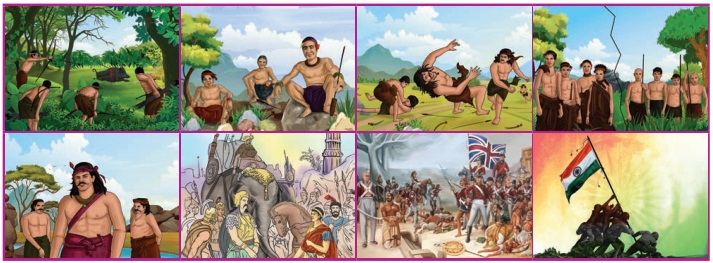
“Types of democracy!”
“Yes, there are
various types of democracy in practice around the world. Among those, direct
democracy and representative democracy are the most popular
forms of government.”
The birth place of democracy is
Greece.
“What is Direct
Democracy?” asked Sirajudeen.
“In a Direct
Democracy, people have the power to frame laws. If we consider your Sports Club
as an example, you all can discuss and amend laws and rules. The perspective of
each member is considered and each one expresses his view. But how will you
take a final decision?”
“The choice of the
majority will be accepted. The others will also give their consent,” said
Selva.
In a Direct Democray, only the
citizens can make laws. All changes have to be approved by the citizen. The
politicians only rule over parliamentary procedure. Switzerland has had a long history of a successful direct
democracy.
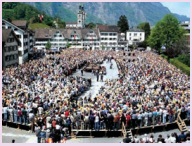
HOTS
Is
it possible to practise Direct Democracy in India?
“Yes, this system
is actually known as Direct Democracy,” said Rajasekaran.
“What do you mean
by Representative Democracy?”
“Imagine that your
Sports Club has more number of members now. Is it possible for hundreds of them
to gather and discuss to take various decisions?”
“No sir”
“In that case, all
the members should be represented by a group of representatives, shouldn’t
they?”
“Yes,” agreed the
students in union.
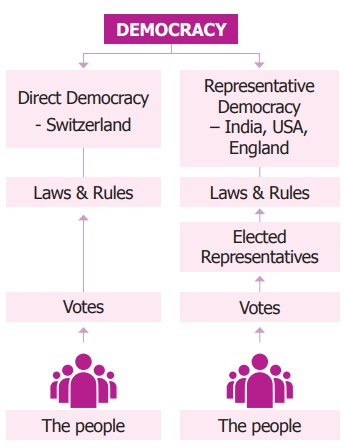
“Those group
members will administrate the sports club on behalf of all the other members.
To select these representatives, elections are held. For example, many contest
for the post of the Head, Secretary, Treasurer and members of the
administration group.
In the end, those
who gain the maximum number of votes will be given the posts. On behalf of the
other members, they obtain the power to take decisions in a democratic manner.
This is termed as Representative Democracy.

“What is meant by
democratic decision making?” questioned Judith.
“In the system of
democracy, the power to take decisions does not lie with the Head. On the
contrary, a group holds the power, but adheres to the rules and regulations.
All the members of the group hold open discussions and take final decisions only
when everyone is convinced. This is called democratic way of decision making.”
“Are there rules
and regulations to govern our country like the rules and regulations of this
group?”
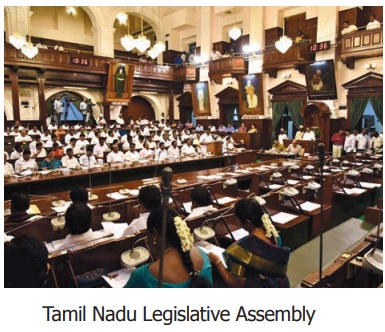
“Yes. In a highly
populated country like India, if people want to live peacefully, they have to
follow certain rules and regulations, rights and duties properly. Hence, the
constitution of India guides us in all these aspects and plays an important
role in maintaining law and order.”
In 2007, the UNO General Assembly
resolved to observe 15th September as the International Day of Democracy.
“What are the
rights given in our Constitution?”
“Our Constitution
ensures freedom, equality and justice to everyone.”
“What other
features are found in our constitution?”
“It defines the
political principles, the structure of the government institutions and methods
to follow these rules and regulations, the powers and responsibilities. And
also, it fixes the Rights and Duties and the Directive Principles of the
citizens.Thus our constitution provides a structure to us.”
“Is the
constitution of India such a detailed one?” asked Tamizhselvi in amazement.
“Indian
Constitution is the longest written constitution in the world. It is drafted by
the Drafting Committee of the Constituent Assembly headed by Dr. B.R.
Ambedkar. That is why we call him the ‘Chief Architect of our
Constitution’ Rajasekaran concluded.
The students
clapped with joy and thanked him for the simple explanation of democracy.
Aims of Democracy
Democracy is
defined as “Government of the people, for the people and by the people.”
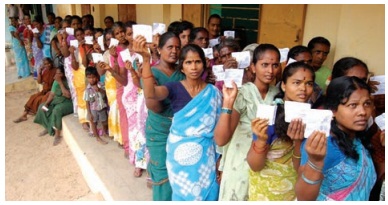
In a democracy, the
power is vested in the hands of the people. For that, the people should have
rights to take decisions. Everyone cannot participate in decision making. So,
the representative government elected by the people to form a democratic
system, all those who attain the age of 18 are given the voting rights to elect
the representatives. At the same time, the representatives have
theresponsibility to protect the welfare of the people.
World Democracy
New zealand is the
first country to allow women to vote (1893). Voting rights to women were given
in 1918 and 1920 in the UK and USA respectively. At the same time, the wealthy
alone were given the voting rights in India. Many leaders like Mahatma Gandhi
kept insisting on giving voting rights to all. Now in India, all the people
above 18 years of age enjoy Universal Adult Franchise.
The world statisticaldata on
democracy declares that 79% of the Indian citizens have faith in the democratic
system. Hence, India ranks first among the democratic countries of the world.
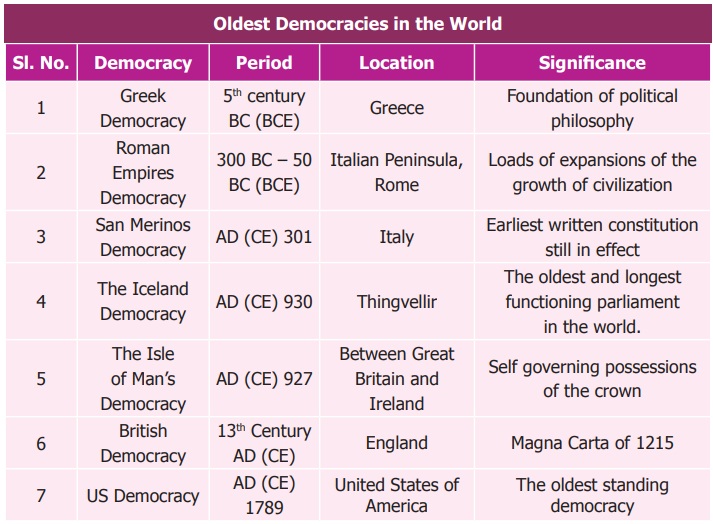
GLOSSARY
1. Democracy - a government formed by the people
2. Election - a process by which a representative
is chosen
3. Decision - to make up one’s mind
4. Government - a group of people with a authority
to govern a country
RECAP
* "Government
of the people, by the people for the people" is defined as democracy.
* Direct
democracy and Representative democracy are the types of democracy.
* Our
constitution ensures freedom, equality and justice to everyone.
* Indian
constitution is the longest written constitution in the world.
* In India,
all the people above 18 years of age enjoy Universal Adult Franchise.
ICT CORNER
Civics - Democracy
Through this activity
you will
about structure of government of In and political
systems!.
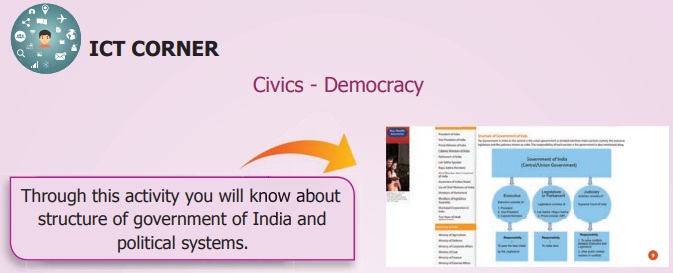
Steps:
Step 1: Use the URL or scan the QR code to open the
activity page.
Step 2: Click
the “political systems” to know government of India.
Step 3: Click the “English” button the map will
appear.
Step 4: Choose and click “Tamilnadu” to know about the
state government.
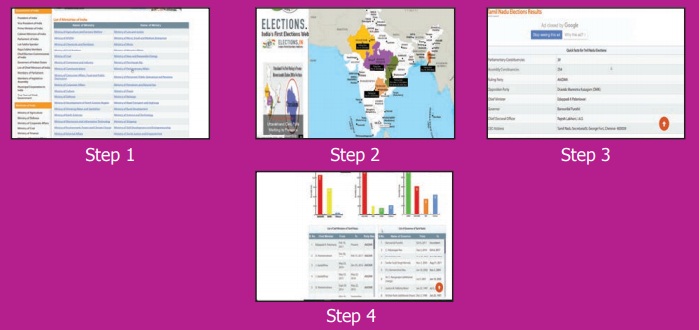
*Pictures
are indicatives only.
Browse in the link
Web:
http://www.elections.in/ (or) scan the QR
Code
Related Topics